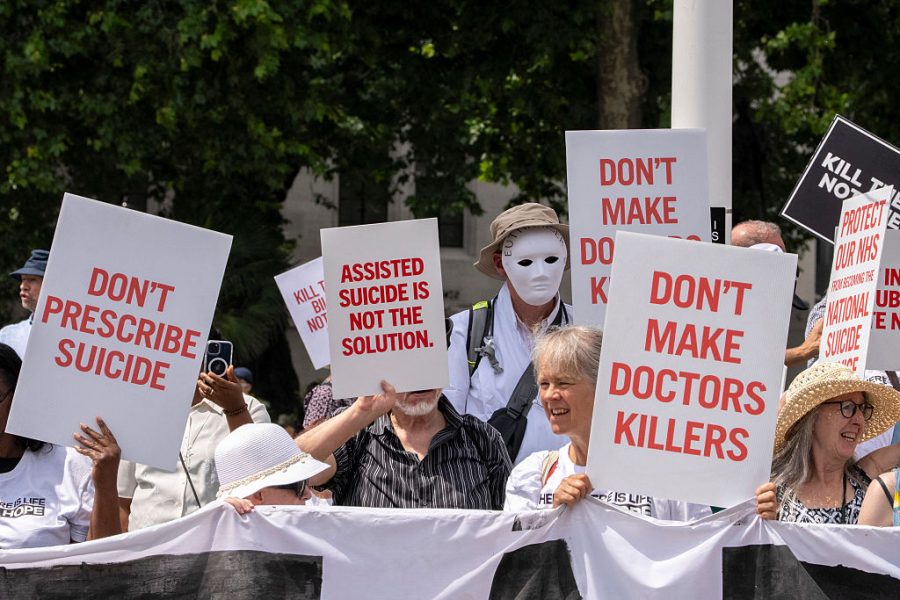Could the House of Lords block the assisted suicide bill, which was approved by the Commons yesterday? It would be pretty unusual for the Lords to do so. But then nothing about the bill has been usual.
Proponents like to compare Kim Leadbeater’s bill to the big private member’s bills of the 60s on abortion, homosexuality and the death penalty. One difference is that those bills cleared the Commons with huge, commanding majorities. This bill was dragged over the finish line by a very small margin – just 23 votes – and amid a stream of defections from yes to no. In the seven months since the Commons first debated it, the bill’s margin of support has more than halved, to the point where it has now lost its absolute Commons majority.
It is a sad comment on the state of the Commons, reduced to hoping Mummy and Daddy will clear up its mess
So we have a sweeping, society-changing proposal with, at best, a very lukewarm sort of thumbs-up from the lower house. One indication of the general atmosphere: Wes Streeting – the cabinet minister whose brief is most affected by the bill – yesterday evening retweeted a post from Diane Abbott declaring her intention to ‘keep fighting’ on behalf of the vulnerable people threatened by the bill. This is not exactly a moment of consensus.
More than that, some MPs who voted in favour seem to have done so with little confidence in the actual legislation. According to Politics Home, a ‘furious Labour peer’ complained this week that MPs were telling him they ‘were unhappy with the detail in the bill, but were intending to vote it through on principle and leave it up to the Lords to carry out the thorough scrutiny’. A Labour MP, meanwhile, claimed that colleagues who openly called the bill ‘a mess’ were nevertheless planning to back it.
Yesterday in the Commons Sir Iain Duncan Smith observed with some exasperation that MPs seemed to be assuming they could pass the bill ‘onto the other House in the vague hope that somehow, they will do better than us and make changes such that it will become a workable piece of legislation’.
Much of the Commons, in short, seems to have voted out of sympathy for the principle of assisted suicide, while sheepishly hoping that somebody else – the Lords – would actually take responsibility for it. That is a sad comment on the state of the Commons, reduced to hoping Mummy and Daddy will clear up its mess. But it also gives the Lords reason to think that, if they are being asked to do the entire job of scrutinising the bill, they can also block it.
But is that actually within their role? Surely unelected peers can’t override a decision from the elected chamber? Well, yesterday one of the most distinguished constitutional experts in the country, Professor Mark Elliott of the University of Cambridge, argued just the opposite: it would be entirely within the constitutional remit of the Lords to vote it down – or to produce ‘a deadlock situation if, at the ping-pong stage, the Commons (say) refuses to approve additional safeguards the Lords have inserted by way of amendments’.
Professor Elliott takes the objections one by one. Yes, there is a convention that the Lords doesn’t vote down government bills on manifesto commitments, but the Leadbeater bill is neither. Yes, the Commons has priority as the democratically elected chamber, but that doesn’t mean the Lords can’t reject a bill – it just means the Commons might have to override them by using the Parliament Acts to reintroduce the bill. Yes, the Parliament Acts might, in the case of a private member’s bill, be difficult to put into effect, but nothing stops the government reintroducing the same bill.
This would all be academic, of course, if the Lords was wholly persuaded by Leadbeater’s bill. But as the legislation has made its shambolic progress through the Commons, several peers have spoken out with deep concern. And earlier this year it was reported that ‘Senior peers … believe the bill will struggle to get through the Lords, because there’s strong support for leading opponent Baroness Tanni Grey-Thompson, the Paralympic champion.’
There is certainly enough work for their Lordships to do. The Royal College of Psychiatrists, Royal College of Physicians, Association for Palliative Medicine, British Geriatrics Society, Coalition of Frontline Care, Disability Rights UK, Liberty, Standing Together Against Domestic Abuse, a coalition of eating disorders charities, the National Down Syndrome Policy Group, the head of the government’s suicide prevention strategy and the former High Court judge Sir James Munby have all, from their different angles, raised the alarm about a bill they see as socially transformative and profoundly dangerous.
Perhaps it’s no wonder that the Commons passed the buck. But by doing so they have added to the sense that nobody truly wants to own this legislation. When pressed on the momentous implications of the bill, Kim Leadbeater effectively says that the government can sort it out later. The government, when asked, shrugs and say it’s not their bill. At some point, somebody has to take responsibility. And if the Lords don’t, it looks like nobody else will.






Comments